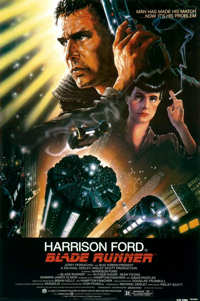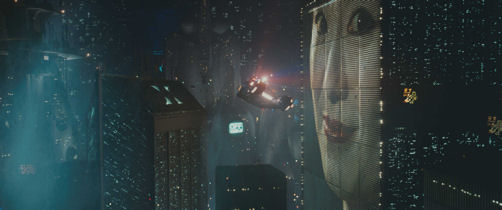 1982 was a good year for science fiction on film: on the one hand you had Steven Speilberg’s E.T. The Extra-Terrestrial, which was one of those inescapable blockbusters that was as much an event as a film; on the other hand we were given John Carpenter’s The Thing, which seemed to be the cinematic inverse of Spielberg’s offering. Transcending that dichotomy, however, was Ridley Scott’s Blade Runner, a futuristic film noir that is arguably the most important science fiction film of the 1980s — certainly, it was one of the most influential.
1982 was a good year for science fiction on film: on the one hand you had Steven Speilberg’s E.T. The Extra-Terrestrial, which was one of those inescapable blockbusters that was as much an event as a film; on the other hand we were given John Carpenter’s The Thing, which seemed to be the cinematic inverse of Spielberg’s offering. Transcending that dichotomy, however, was Ridley Scott’s Blade Runner, a futuristic film noir that is arguably the most important science fiction film of the 1980s — certainly, it was one of the most influential.
It is Los Angeles in 2019, and within the urban decay are four rogue “replicants” — sophisticated androids that are virtually indistinguishable from humans. Rick Deckard (Harrison Ford) is a former blade runner — a detective charged with tracking down and “retiring” (i.e. killing) rogue replicants — and he’s brought back on the job to retire the current four who are still on the loose.
Blade Runner is an important film for a number of reasons. Firstly, it helped to define the “cyberpunk” subgenre: its world was a grimy, sprawling urban landscape fused with high-tech industry, and this became the paradigm upon which so much science fiction was later built. Secondly, its themes of humanity, creation and the nature of memory are dealt with seriously but never in a heavy-handed manner. And finally, it’s yet another case of a film that was relatively unsuccessful at the time of release but whose influence was so marked that it’s now regarded as a classic almost by default.
This is the work of an auteur whose vision so dominates the film that it could never have been made by anyone else. The sets are exquisite, with the lighting and cinematography striking just the right mood for any given scene, and every shot, every frame, every cut announces that This is a Ridley Scott film. This is the sort of cinematic experience whose images linger long after the credits roll — if one word describes Blade Runner, it is “haunting”.

There are, however, flaws that cannot be ignored. There is a rather detached feel throughout that keeps the audience at arm’s length, and this is only compounded by the romance between Rachel (Sean Young) and Deckard, which is never quite convincing. The love scene in particular is rather awkward and (it could be argued) borders on being a rape fantasy. Still, these are minor quibbles when examining the film as a whole.
The most interesting twist in the Blade Runner saga is that now, 25 years after its initial theatrical run, comes Scott’s so-called “Final Cut”, itself 15 years after the apparently misnamed “Director’s Cut” of 1992. This is, without a doubt, the definitive version of the film, combining the best qualities of the prior cuts while subtly tweaking areas that still needed some attention. Never do the changes feel gratuitous (unlike the special editions of certain other beloved science fiction films of the era), although some are still radical if you’re comparing this to the 1982 theatrical cut: as with the Director’s Cut, Ford’s voice-over narration is missing, and the unicorn dream is still included. Both alterations are, in my opinion, for the better, but purists should note that the theatrical cut is available on DVD with certain Blade Runner boxsets.
Ultimately, then, is Blade Runner — in any cut — a perfect film? No. Is it a great film? Yes, and already that sets it apart from most other films released in the intervening years.





Gak! Please don’t mention “Blade Runner” in the same breath as “E.T”. I nearly got tossed out of the theatre when I called out loudly at the end of “E.T.” (as his spaceship was taking off) “Shoot it down!”.
The “Blade Runner” soundtrack was superb, the best thing Van Gelis ever did. That sax solo during the “Love Theme”–wow.
That said, I hope they stop releasing all these definitive cuts, director cuts, everything-but-the-kitchen-sink cuts. Talk about milking fans, this is the type of shit George Lucas pulls off so successfully and desperate fans are happy to oblige…
Nice review. I just picked up the 4-disc set, which was a bargain at something like 22 bucks.
looks like we have the same taste in movies, at least by looking at you banner.
Alien, Blade Runner, Gladiator (and a few others), wow…….
Cliff,
I have fond memories of seeing E.T. when it was first released. Granted, I was four at the time, and I think I saw it on video when I was about ten and found it boring, but…
(Maybe I should take another look at it.)
As for the multiple cuts of Blade Runner, the only superfluous version is, in my opinion, the Director’s Cut. I actually own the 5-disc DVD set with all five cuts (i.e. workprint, U.S. theatrical cut, European/Criterion cut, Director’s Cut and The Final Cut) and each one has a legitimate reason for existing. Personally, I’d be more annoyed if the theatrical cut was ignored or never released.
Being a Star Wars fan myself, the thing that bugged me the most was how the theatrical cuts weren’t available on DVD. They are now, of course, but only in a non-anamorphic transfer from the laserdiscs. (The 1997 Special Editions are still MIA, as is the theatrical cut of The Phantom Menace, not that anyone’s clamoring for that!)
At least Scott made the effort to give us very nice transfers of all prior cuts of Blade Runner — including HD editions — and released several configurations at different prices simultaneously, giving the buyer the opportunity to buy according to their level of interest.
spencerd,
I’m a film fan but also a bit of a geek. Yes, my banner quite accurately reflects my taste.
Good job on the 4-disc Blade Runner set — I think you’ll really enjoy it.
Anyway, thanks for visiting and I hope you stick around.
4 disc set *drools* !!!
love,
http://itsjustaphase.wordpress.com/
[…] Giraud (who had previously worked on Alien (1979)) and Syd Mead (who was also working on Blade Runner (1982) at the time), the backdrops, vehicles and costumes perfectly blend angular, geometric […]
I think Scott purposely keeps viewers at arms length by not giving us much to chew on from the perspective of the human characters. They’re wooden, detached, more concerned with protecting their own sorry butts than appreciating life. By contrast the replicants feel sorrow, loss, desperation and an even joy. They laugh, joke, cry and try their hand at love. At the end Roy saves Deckard simply so that he can relate some of his most cherished memories to him. It’s his way of saying to the human race “Wake up! You don’t know how lucky you are.”
I’m for one am glad that Scott went back in and corrected some of the visual gaffes, this film deserves it.